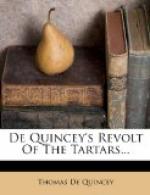The Revolt of the Tartars is a good illustration of his power. Attracted by the chance reading of an obscure French missionary and traveller to the dramatic possibilities of an episode in Russian history, De Quincey built from the bare notes thus discovered, supplemented by others drawn from a matter-of-fact German archaeologist, a narrative which for vividness of detail and truthfulness of local color belongs among the best of those classics in which fancy helps to illuminate fact, and where the imagination is invoked to recreate what one feels intuitively must have been real.
The Revolt of the Tartars, while not exhibiting the highest achievement of the author’s power, nevertheless belongs in the group of writings wherein his peculiar excellences are fairly manifested. The obvious quality of its realism has been pointed out already; the masterly use of the principles of suspense and stimulated interest will hardly pass unnoticed. A negative excellence is the absence of that discursiveness in composition, that tendency to digress into superfluous comment, which is this author’s one prevailing fault. De Quincey was gifted with a fine appreciation of harmonious sound, and in those passages where his spirit soars highest not the least of their beauties is found in the melodiousness of their tone and the rhythmic sweetness of their motion.
It is as a master of rhetoric that De Quincey is distinguished among writers. Some hints of his ability are seen in the opening and closing passages of this essay, but to find him at his best one must turn to the Confessions and to the other papers which describe his life, particularly those which recount his marvellous dreams. In these papers we find the passages where De Quincey’s passion rises to the heights which few other writers have ever reached in prose, a loftiness and grandeur which is technically denominated as “sublime.” In his Essay on Style, published in Blackwood’s, 1840, he deprecates the usual indifference to form, on the part of English writers, “the tendency of the national mind to value the matter of a book not only as paramount to the manner, but even as distinct from it and as capable of a separate insulation.” As one of the great masters of prose style in this century, De Quincey has so served the interests of art in this regard, that in his own case the charge is sometimes reversed: his own works are read




